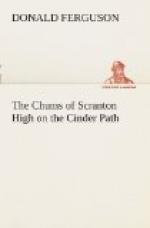The boys, as a rule, looked very much like lithe grayhounds, for your natural runner is light of body, and can course along like the wind. Still, this applies more to short-distance sprinters than those whose specialty is endurance in a fifteen- or twenty-mile race.
Several of the fellows were quite muscular in build, and gave evidence of a grim determination such as the bulldog possesses. These chaps might be easily distanced in the start, but they would keep doggedly on, under the spur of the knowledge contained in that old adage that “the race is not always to the swift.”
Hugh Morgan was, perhaps, the best built of them all, neither too heavy, nor yet betraying a weakness that would crop out after the first five miles had been covered, as might be the case with the more slender fellows.
They stood in line, listening to the last words of caution delivered by Mr. Hitchens, a former Yale man who had umpired the baseball games the preceding summer in such an impartial manner that everyone had the utmost reliance on his fairness.
He explained to them the simple conditions of the race,—how there must be no fouling of any kind; just how often and where the contestants must register their names in books kept by judges on the course; how each was supposed to give his word of honor not to accept any sort of lift for even a dozen feet; and that the great crowd assembled would be waiting to acclaim the first-comer as the victor in the greatest long-distance race ever attempted by high-school boys, at least in that particular county.
They were allowed a certain latitude as to their methods of running. If any of them could cut across lots, and still cover the entire course, as well as register faithfully wherever required, that was to be their option.
Having finished his little fatherly talk, the referee stepped to one side, and gave the word for the runners to make ready.
Every eye was glued on this or that contestant, according to the humor of the spectator. Each Allandale visitor saw only Allandale in that long line, swaying back and forth a trifle, like a reed shaken in the wind. They could not believe it possible that any other fellow had the slightest chance of coming in ahead of those fleet-footed boys upon whose ability they pinned their full trust.
So it was with the Belleville rooters; while, of course, the natives were certain the prize was already as good as won by Hugh Morgan; or, it might happen to be, Horatio Juggins, “Just” Smith, or possibly Nick Lang, the last-named looking ever so confident, as he leaned over nearly double in his favorite crouch, his fingertips in contact with the ground, and his knees bent.
Then came the sharp report of the pistol.
“They’re off!” involuntarily exclaimed a thousand persons in unison, as the line of nimble runners was seen to leap into action, and shoot away with amazing speed.




